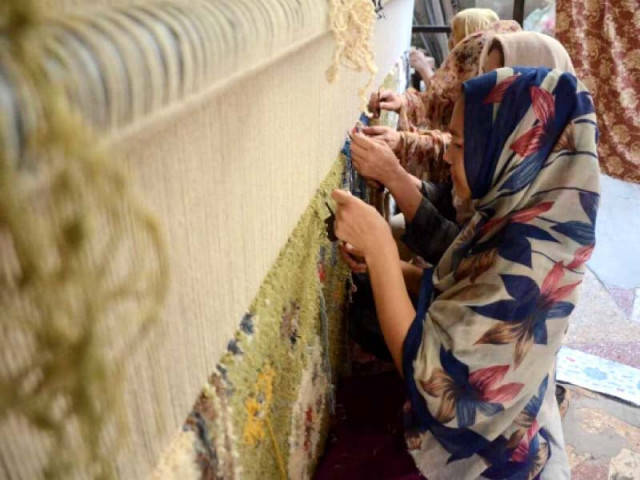Local carpet industry in perils of pandemic
Business owners fear that the losses incurred during Covid-19 might hammer the final nail in the sector’s coffin

The refugee movement to Pakistan, during the Soviet invasion of its northwestern neighbour, brought with it a new dawn for a sector which had long remained in the shadows of obscurity. Many among those tens and thousands of skilled-workers who made the journey to Pakistan, were old-hand rug manufacturers once at the helm of the Afghan carpet industry. Their migration to Pakistan, also meant the migration of their ancient business, which they consequently had to reestablish in Peshawar and across Khyber Pakhtunkhwa.
So is how the country’s northwestern province came to be known as a new cradle for the Afghan carpet industry. This was some four decades ago, towards the end of which, the repatriation of refugees to Afghanistan, had ineludibly left the local carpet industry on its last leg. However, it is feared that the impact of the on-going Covid-19 pandemic might hammer the final nail in the industry’s coffin, closing chapter to a sector which was once an object of global fascination.
According to Hassan Khan, an Afghan businessman associated with Peshawar’s carpet industry for the past 40 years, the few remaining skilled weavers in the region have now started jumping ships amid an industry-wide economic crash. “Much of this is owed to Covid-19, which has put so many people across so many sectors in straitened circumstances. Our handmade carpets once sold like hot cake across western markets. But in the last eight months, with travel bans and falling economies, we’ve barely sold a carpet locally let alone in foreign markets,” the trader lamented.
Despite the steep drop in prices of Afghan carpet in local markets, the sector reported making marginal sales for the greater extent of the current year. “The carpets which easily sold for $150 some eight months ago, won’t even sell for as little as $50 today. I had never seen such a drastic fall in business before the virus took over the world,” told Khan.
As a consequence of the pandemic, some seventeen big and small, hand-made Afghan carpet factories have been closed down across Peshawar, putting over 200 Afghan artisans out of work and in the red. Resultantly, the many women of Hashtnagri, Gulbahar, Dilla Zak Road and Board Bazar, who once made a living weaving the most extraordinary carpets from the safety of their own homes, have now been forced to fend for new employment in the city.
Hassan Khan’s business, which once sold around the world and employed more than 70 workers, today faces an 80 per cent reduction in customers, retaining less than a fraction of its former workforce. “The carpets we have already made are starting to wear out from laying in the warehouse for too long. While most of our artisans have now started pushing wheelbarrows and street hawkers, selling fruits, vegetables and bread from one street to another.”
Without government patronage, Khan believes his industry faces a grave and possibly fetal threat.
Published in The Express Tribune, December 25th, 2020.



















COMMENTS
Comments are moderated and generally will be posted if they are on-topic and not abusive.
For more information, please see our Comments FAQ